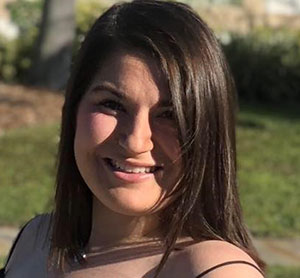Loyola's School Counseling Program Made Me a Confident and Culturally Competent Counselor

Gabriel “Gabby” Diener received her Bachelor of Science in Healthcare Management with minors in Spanish and business from Towson University. Following a different route, in 2018 Diener completed Loyola’s Master’s in School Counseling program. She then continued her studies at Loyola to pursue her Licensed Graduate Professional Counselor (LGPC) certification. Today, Diener is a child and adolescent therapist at a private practice in her hometown, Columbia, Md. We sat down with Gabby to learn more about her and her experience in Loyola’s school counseling program.
What is your experience? What were you doing professionally before you enrolled in Loyola’s school counseling program?
Growing up, I always loved working with kids. For my final semester at Towson University, I had to do a full-time internship. I ended up having an amazing internship at The Children’s Inn at The National Institutes of Health (NIH), which is a facility for children and their families who are receiving treatment at the NIH. Although I was in a healthcare management internship, I had the opportunity to interact with children and their families daily. Throughout my internship at the NIH, I had a crystallizing moment where I realized that my passion was working with kids. School counseling had always been an interest of mine, so I decided to pursue it! After I completed my internship, I excitedly applied to Loyola’s school counseling program.
Why did you choose Loyola?
First, I chose Loyola because their mission resonated with me. As someone who is passionate about helping children, I loved that Loyola was committed to preparing their students to be school counselors who are leaders and agents for systemic change. Additionally, I loved that Loyola offered the Master’s Plus program because I knew I was interested in getting my licensure in the future.
What inspired you to pursue a career in school counseling?
Like many others, I grew up with some amazing school counselors. These counselors absolutely play a vital role in who I am today. Also, my experience at my internship at the NIH really solidified wanting to work with kids.
How did Loyola’s school counseling program help you in your career?
The knowledge I gained and the experience I had at Loyola has played an instrumental role in my career. I am a much more culturally competent counselor because of my experience at Loyola. During my time at Loyola, professors constantly challenged students to become more aware of cultural differences, which has helped me immensely. My favorite class in the entire program was the cross cultural counseling course because my professor facilitated meaningful discussions that truly made me think about the world around me. Also, Loyola’s school counseling program helped me to be more confident in my abilities to advocate for my students/clients. Now, as a child and adolescent therapist in the community, I feel very comfortable educating my clients about services offered in the education system to help them succeed. I often go to 504 and IEP meetings to advocate for my clients as well!
What are your future aspirations or goals as a counselor?
This is going to sound cliché, but my main goal as a counselor is to help my students/clients
succeed. Also, I am passionate about ensuring that all students have access to mental
health resources in the school system. We need more mental health professionals available
in schools, and I will continue to advocate for this!
Diener would like to credit her professors in the program, Dr. Jenn Watkinson, Dr. Gayle Cicero, and Dr. Qi Shi. She says, “They are knowledgeable, supportive, and incredible role models!”
Interested in being a student in Loyola’s Master’s in School Counseling program?